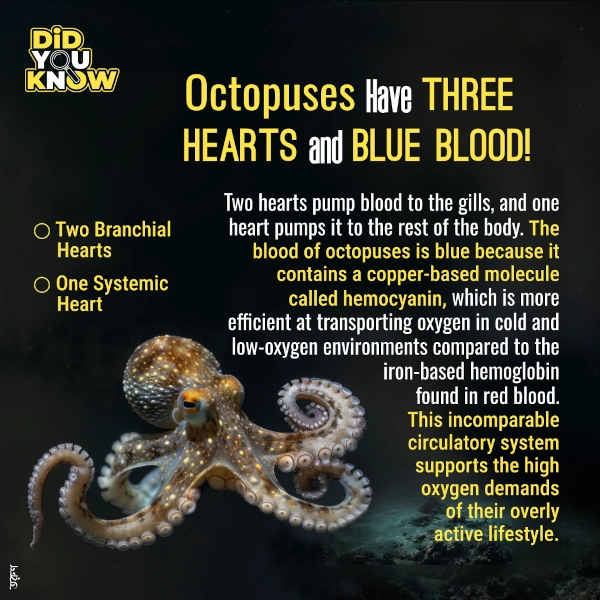
Octopuses Have Three Hearts and Blue Blood!
Octopuses are fascinating sea creatures with an anatomy uniquely suited to their underwater lives. Unlike most animals, they have three hearts—two branchial hearts that pump blood to their gills and a systemic heart that circulates blood to the rest of their body. Their blood isn’t red like ours but a striking blue! This is because it contains hemocyanin, a copper-based molecule, rather than hemoglobin. Hemocyanin excels at transporting oxygen in cold, low-oxygen environments, perfectly supporting the octopus’s high-energy lifestyle.
The Power of Blue Blood
Octopuses’ unique blood and circulatory systems give them incredible adaptations to their ocean habitat. Hemocyanin allows them to thrive where oxygen is scarce, while their three hearts support active, complex behaviors, including camouflage and problem-solving. These adaptations reveal how evolution shapes species to fit their surroundings in remarkable ways, especially in the depths of the sea. Understanding octopuses also offers insight into how different life forms meet their environmental challenges.
Energy for Active Adventures
Known for their intelligence and agility, octopuses have significant oxygen needs, especially while hunting or escaping predators. Their unique circulatory system, combined with hemocyanin, meets these demands, helping them stay active even in challenging ocean depths.
Fun Facts
- Octopuses can change the texture and color of their skin for camouflage, thanks to special cells called chromatophores.
- Despite their alien-like appearance, octopuses are highly intelligent, capable of using tools and solving puzzles.
- They have a decentralized nervous system, with two-thirds of their neurons in their arms—allowing each arm to act almost independently.
For more amazing animal adaptations, check out our “Animal Adaptations“ category and discover the incredible ways creatures have evolved to thrive in their habitats!

We choose not to clutter your experience with ads. If you’d like to support us, consider showing some love by liking this post on X (Twitter) or on Instagram!
Share this Post, Spread the Knowledge!
